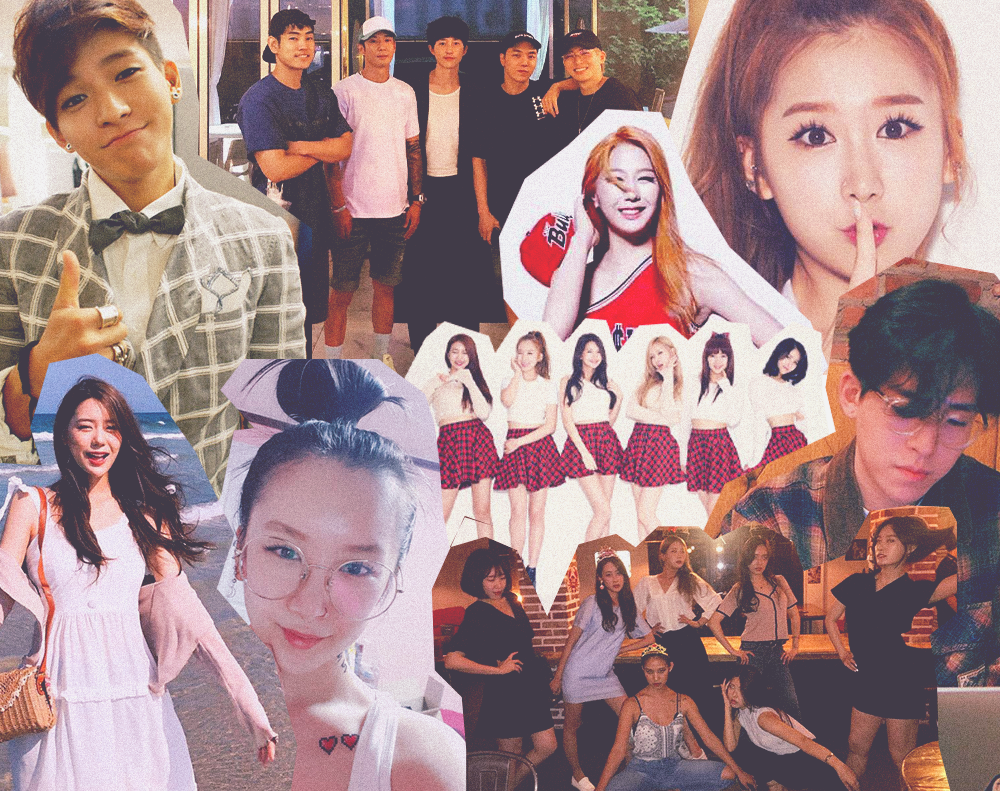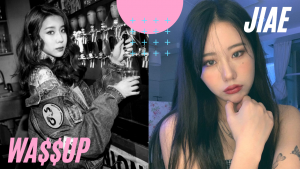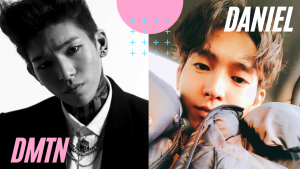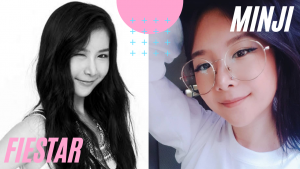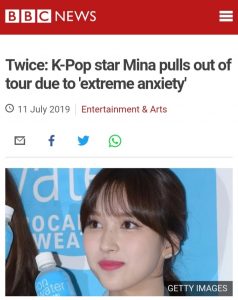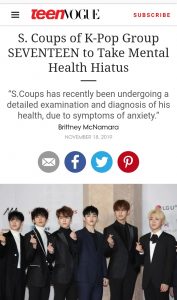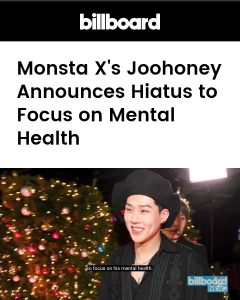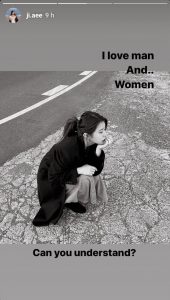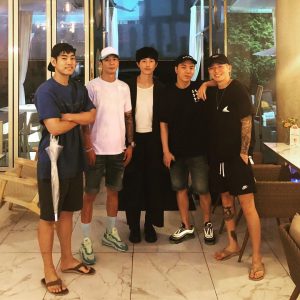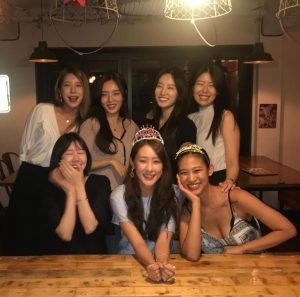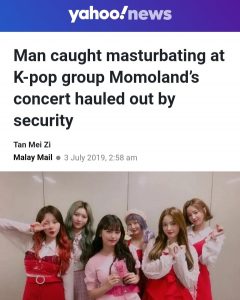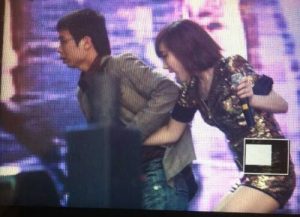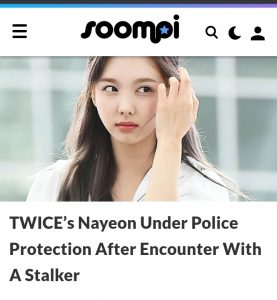Artists share what they experienced inside the K-Pop industry.
 Warning: This article doesn’t intend to generalize the experiences faced by South Korean idols, but to inform about the different realities existing within the industry.
Warning: This article doesn’t intend to generalize the experiences faced by South Korean idols, but to inform about the different realities existing within the industry.
Colorful music videos, catchy chorus and powerful choreographies: these are some of the most well-known aspects of K-Pop. But it’s a whole other history between the stages and backstages. It’s only when scandals erupt that we know part of the many truths that surround this world — or when artists decide to share with the public their experiencies within the music industry.
The contractual ties with companies, however, make it difficult to the idols current active in the K-Pop market to talk about their experiences with total honesty. Making it a mission in the hands of the ones who are less afraid of the consequences or those who are no longer part of this universe, such as: Francesca MinJi Ahn (28) – or Cheska, stage name that she used during her career in the girl group Fiestar; Daniel Chae (29), Daniel from the boy group DMTN and Jiae (26), who was WA$$UP‘s lead singer.
Invited by K4US, the three artists exclusively shared what they saw, lived and conquered within the South Korean entertainment industry.
About trainees, life conditions and contracts
Naturally, the training period for idols is already hard. Besides the pressure to reach coachs and companies’ expectations, the youngsters often need to balance long hours of training with school routine. The simple fact of fullfiling a dream already puts these people in a situation of vulnerability in the face of possible abuse and neglecting by the company.
Before becoming Fiestar’s Cheska, Minji was attract from the United States to South Korea with the promise to become the second BoA. But the conditions she had to live before becoming a star were not bright at all. “I ended up living in saunas for months, carrying around 3 luggage’s and practicing everyday in a very small company”, says the streamer, who even gave up for some time, before going back to try her luck as a member of a K-Pop group.
Her experience as a trainee and, later, as a member of Fiestar, wasn’t exactly better: “I would also get $450 a month, that later, when I wanted to leave the company, I found out it was a loan.” The amount should be used for some services that many believe are offered by the agencies themselves — from food, which consisted in a strict and expensive diet imposed by the company, to skin care, hair and nails; massages; and any kind of class, like singing or dancing.

Fiestar: When Minji still went by the stage name ‘Cheska’
“Usually, most companies require you to payback a certain amount before they start handing out paychecks. No matter how much work you put in, if it doesn’t hit that required amount, you’re walking out with nothing,” explains the current photographer and producer Daniel Chae (DMTN), about a situation that Jiae (WA$$UP) knows intimately.

Daniel during his Dalmatian/DMTN days

WA$$UP: Jiae’s debut in the entertainment industry
About psychological pressure and its aftermaths
The period between 2019 and 2020 is, probably, the moment wich K-Pop fans saw the most idols stepping away from their activities to focus on physical and, especially, mental health care.
Last year, more than ten idols faced this situation. The number may seem low, but K-Pop had periods in which artists wouldn’t even reveal about their health problems to the audience, neither would they stop working because of this.
Although the industry isn’t the only villain in these cases, the environment and working conditions definitely contribute to the development of bad physical and mental conditions. Since the training times until life as idols, these artists are subjected to different kinds of psychological pressures.
In Jiae’s case, even if unconsciously, this pressure’s reflected on her behavior: “I could have had some personal time, but I locked myself in. I only went to the practice room or the cafe every day,” says the singer about her training days.
Even today, she doesn’t quite understand the relationship she made between a good performance as a singer and the idea of depreving herself from her freedoms. “I think it was some kind of obsessive compulsive disorder,” confesses.
Minji, who reports a career full of problematic situations, faced limitations and impositions on company’s part that ranged from the most subtle to the most radical ones. The streamer claims that they had all songs from her iPod replaced by songs determined by the agency, and that she was forbidden to speak in English. In addition, she was instructed to ask friends and family to delete photos with her, so fans couldn’t point the differences between before and after plastic surgery.
These seemingly harmless instructions, added to other forms of psychological issues and sexual harassment, which turned Minji’s dream into a real nightmare. She sums it up: “Idol life gave me depression, anxiety, ADHD, paranoid personality disorder, insomnia, low self esteem, and suicidal thoughts.” It was enough for her to, eventually, leave the industry with no plans to return.
After their experiences in the industry, Minji and Daniel left the idol career for good
Despite a less troubled relationship with the company that managed his group, Daniel also recognizes the difficulty on maintaining an idol’s lifestyle. “Living daily to win the approval of others no longer seemed like a healthy way to live. I appreciated (and still do) all the love and support but realized that trying to survive in the game was becoming detrimental for my mental health.”
About laws and scandals
A legislation with the purpose to protect the etertainment industry professionals might reduce good a part from theses abuses, physical and psychological damage. But currently, the only law in this regard is aimed at the welfare of only minors working in the Korean entertainment industry.
The law guarantees that young people up to 18 years, had some basic rights, such as rest and study hours, besides reduced work hours — artists up to 14 years old can only work 35 hours a week, and the age ones from 15 to 18 yers has a limit of 40 working hours a week. In addition, the determination makes it illegal to induce minors on wearing very revealing clothes and performing sexually suggestive choreographies.
Approved in 2014, the law definitely considers an especially vulnerable part on the entertainment market, but its enforcement and effectiveness are questionable.
In 2018, for example, it became public the case from the band TheEastLight members, who suffered physical violence for three years, by the hands of CEO and producer from Media Line Entertainment, the group’s company. Despite unacceptable at any age, the abuse happened and the law didn’t guarantee the welfare of these young people, as it aims to.
With or without legislation, the number of scandals wich idols are victims increases, but so does the number of controversies caused by the artists themselves. In these situations, the idols are the ones damaging the other extreme side of the system: the companies.
“You need to understand that one wrong decision can jeopardize your whole team/company. So, in all honesty, I don’t blame my previous company or any company who decided to save themselves by dropping an artist for their foolish decisions. I’m not taking sides, just telling the truth, I would have done the same,” declares Daniel.
The photographer and producer, who was involved in a scandal back in his DMTN days, believes that he himself started his career with the wrong mentality and, therefore, ended up taking the wrong decisions. Despite believing that we’re all susceptible to make mistakes, the ex-idol also defends that you can’t blame an industry or company for your failures. “As an entertainer, you need to be prepared for a shit storm if you ever do get caught for something other people would get a slap on the wrist for,” afirms.
Daniel’s statement also explains a recent case that had a strong repercussion in the K-Pop fandom: Monsta X’s Wonho case. The singer, who was recently cleared from all charges, declared in a interview with Dispatch that his departure from Monsta X was a decision he made, considering the damage he could cause to the group’s image.
About being or not being yourself
As fans and regular consumers of contents produced by our favorite idols and groups, we often believe we actually know these people. But something scandals have been proving in the past few years is how far we are from this intimacy that we believe we have with our favorite artists.
A great example of this is the Burning Sun case and its outcomes, which exposed the truth about several idols. Those involved proved to be sexual predators and yet many fans continued to defend them — much of this due to this idea, encouraged by companies and promoted by the artists themselves, that fans know the true nature of their idols.
In fact, inside an environment full of personal limitations and psychological issues, as mentioned earlier, sometimes not even the artists have the opportunity to truly know themselves.
Jiae, who came out as bisexual in 2019, didn’t even consider her sexual orientation while at WA$$UP. “No matter if you were straight, gay or bissexual, you were not allowed to have any kind of relationship. I couldn’t realize I was bissexual in this situation, since I didn’t even have the freedom to think by myself,” she says.
“I don’t expect them to understand me, but I hope they don’t judge or insult me,” adds the singer, who worries about the audience’s reception now that she is making her way in music through a solo career. Despite the fear in this new reality, she intends to bet on her own identity not only when it comes to assuming her sexual orientation and girlfriend, but also in music. The plan is to focus on the style, in which she always wanted to work, but couldn’t do, during the years at the group.
Despite no longer working with this business, Minji tried to remain in the industry after leaving Fiestar, even because during her time as a member of the group, she also had her real personality denied.
“I was forced to be the cute one,” says the streamer. According to her, the company didn’t assign any role to the members before the debut, but after an “aegyo” performance — as often happens in tv shows with artists — the members themselves put Minji in this position, even though this wasn’t a trait of her personality.
“Everyone has a natural cute side, but it’s not so cute when you have to force it,” she expresses.
About competition
Minji acknowledges that her days as an idol have brought many negative experiences or, as she calls, “the dark side of K-Pop”. While some artists may see some comfort in their group mates, Minji found more problems.
The female rivalry, which many fans suppose to happen within some girl groups, really happened in Fiestar, according to the streamer. Even though she was the main target of the injustices caused by this competition between members, she needed to pretend to the audience that everything was fine.
“I like being honest and telling the truth. I felt guilty, sad, depressed, and all kinds of other negative emotions for years and years. I felt like nobody understood me. I was sick of hiding information and what I went through,” Minji says about the process of making the decision that led her to share her experiences with the public.
After a first post exposing the bullying she suffered from some members of Fiestar, Minji recently brought back the subject in her lives streams via Twitch. Some reports and opinions, expressed by the streamer, had a negative impact on her, but she also revealed worrying aspects of her experience.
According to Minji, only two members of Fiestar didn’t practice bullying. The others, including her, repeatedly intimidated each other. The attacks, which were aimed at those who received public attention, came to life through a rumor inside the K-Pop industry.
“I was told that the most competitive groups were the most successful — for example, Girls’ Generation,” says Minji, who also told us she doesn’t know if the rumor is true. The streamer adds that she believes that the best chances for a group to become successful, include having a good relationship between its members — something experienced by Jiae and Daniel until today.
Although their groups are no longer active, both had an experience full of support and encouragement from their teammates, far from all this toxic competition.
- Part of DMTN nowadays
- WA$$UP’s reunion after disbanding
“There were many altercations and moments when shit hit the fan. But we always squashed the issue and got back to work,” says Daniel about his group of friends, which he defines as his family.
The friendship between former members of WA$$UP has also remained strong, since trainee days. Jiae explains that, now that they don’t work together anymore, they feel even more comfortable to talk, besides knowing exactly what they don’t like about each other.
The friendship that started between them during the group days, allowed the memories not to be filled with negative feelings: “we went through the most special and precious moments of our lives together, so I think we still have many good memories.”
About female experience
Gender equality in the workplace, one of the main guidelines of South Korean feminism, still has a long way to go, even in K-Pop. Although it is evident that men in the industry also go through moments of extreme difficulty, it is necessary to recognize that women in this field go through very specific situations, ranging from sexual and moral harassment to aesthetic pressure, professional devaluation and sexualization.
Jiae, whose group debuted with the main dancing style as twerking, says that when she debuted at the age of 19, she felt overwhelmed by the sexy concept. “I was a high school student in Korea. Of course, there were a lot of fans who loved our group, but at that time we were criticized at the same level,” she says.
At first, the singer felt the seriousness of the sexualization of the female body. Whether she liked it or not, her dance, clothes and work were seen in a negative way, simply because it went against what the public considered right for a group of women to perform.
Still, this same repercussion came to change her perception. It was necessary for the singer to recognize that even a negative public attention could help in the popularity of the group, so she could start to promote without concern alongside the other members.
Minji, on the other hand, experienced one of the main fears of any woman: “I have been taken advantage of, in order to have a promising career,” she reveals. The ex-idol explains that she had heard about stories of harassment in the industry, but only believed it when she became one of the victims.
Even today, years after the event, she doesn’t feel completely comfortable talking about a subject that finds victims not only behind the scenes of K-Pop, but in full view of the public.
It takes experience to know how it rolls
In 2019 we saw the K-Pop industry ceasing to be focus only among those who follow, to gain the spotlight in major publications from the traditional press. There were countless articles on the “dark side of K-Pop”, which talked about how the musical industry of this genre was the cause of tragedies and scandals.
A relação de causa e efeito, porém, não é obrigatória. Muitos dos problemas da indústria, apontados por essas publicações, refletem comportamentos sociais — as longas horas de treinamento de idols, por exemplo, podem ser comparadas aos longos períodos de dedicação aos estudos, praticados pelos jovens, e as longas jornadas de trabalho, exercidas por adultos.
The cause and effect relationship, however, is not a rule. Many of the problems in the industry, pointed out by these publications, reflect social behaviors — the long hours of training, for example, can be compared to the long periods of dedication to studies, practiced by young people, and the long working hours, exercised by adults.
We must also consider that not only the South Korean music industry shows these aspects, and that the experience in this market is not necessarily only negative experiences.
Minji recognizes that not everyone goes through what she went trhough, and that she was unlucky to experience a lot of this negative side of idol life: “I hope that no other future K-Pop idol go through what I went through,” she tells.
As Minji warns about the difficulties so that other trainees and idols don’t face the same as she did, on the other hand, Daniel warns that they should not expect an easy life either.
“Every single person is lured in with the same proposal: money, fame, security, and (hopefully) an easy life. What people don’t understand is the amount of work that goes into recording an album, filming a music video, photoshoots, and etc. No one in the industry ever said it would be easy; however, there is a misconception amongst those who are just now getting started that becoming a singer/entertainer/performer is easier than getting a well-paying job out of college,” summarizes the photographer.
He says that he has enjoyed his life as an idol, but doesn’t think that the amount of stress he has gone through is worth such a short career. Unlike Jiae, who still follows her path in music, this time with the responsibility of being the only openly LGBTQ + woman in the current market.
According to her, if she could go back in time and advise her younger self version, she would say that the entertainment industry is not a place to be afraid or discouraged. “Even if the result was the same, I think I would still be Jiae from WA$$UP.”
Article by Bea and translation by Hope, Chel and Ely | K4US Writing Team
www.k4us.com.br | Do not remove without credits
 Português
Português English
English 한국어
한국어